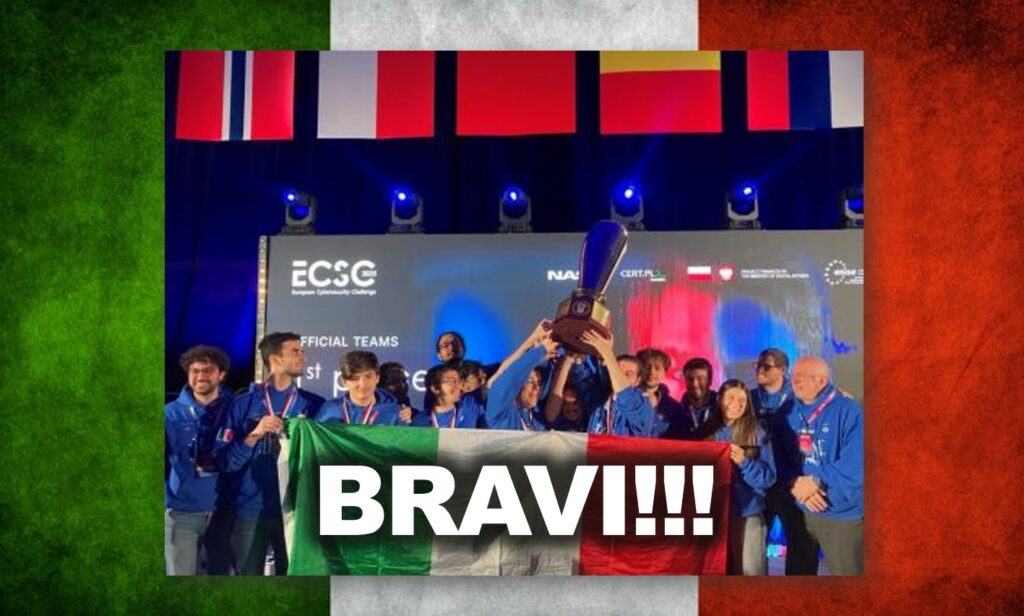
From 6 to 9 October 2025, Warsaw hosted the 11th edition of the European Cybersecurity Challenge (ECSC) . In a close competition among 39 teams from EU member states, EFTA countries, candidate countries, and guest delegations, Italy took first place, followed by Denmark (second) and Germany (third). This achievement marks a moment of national pride in the field of training and competitiveness in the European cybersecurity sector.
The competition was divided into two days with different modalities: the first day followed the Jeopardy model, with problems in various areas (cryptography, forensics, exploits, reverse engineering, etc.), while the second day saw an Attack/Defense scenario in which the teams had to simultaneously defend their own infrastructure and attack that of their opponents.
This combination requires not only technical skills, but also quick decision-making, creativity, and real-time cooperation.
The event opened with a speech by Poland’s Deputy Prime Minister and Minister of Digital Affairs, Krzysztof Gawkowski, together with NASK Director Radosław Nielek.
Gawkowski emphasized how cybersecurity has become a cornerstone of national security, noting that we live in an era where cyberattacks can have impacts comparable to conventional warfare. Nielek, for his part, highlighted the intensity of competition and the importance of engaging with Europe’s best talent.
Juhan Lepassaar, Executive Director of ENISA, hailed the event as “a unique opportunity for young European talent,” saying the challenge allows them to test their technical skills, critical thinking, teamwork under pressure, and communication skills.
Likewise, Luca Tagliaretti, director of the European Cybersecurity Competence Centre, emphasized that the ECSC is more than a competition: it is a platform for building relationships, growth, and shared values.
Together, these statements signal Europe’s commitment to developing and supporting the next generation of cybersecurity experts, essential in an increasingly complex digital landscape. During the competition, participants faced challenges in multiple areas: hardware security, web and mobile security, cryptography, reverse engineering, binary exploitation, and forensics.
Advanced skills weren’t enough: the best teams were able to manage stress, coordinate, respond quickly to unexpected problems, and balance attack and defense. This makes the ECSC a highly realistic testing ground for the cybersecurity professional world.
Immediately following the event, on October 10 and 11, a Female+ Bootcamp for female participants from various national teams was held at NASK in Warsaw. The goal is to enhance the presence of women in cybersecurity by offering technical training, mentoring, and networking. This initiative will lead to the creation of a “Female Team Europe,” which will represent Europe in an international women’s competition in Dublin in 2026.
Italy’s success at ECSC 2025 has multiple implications. First, it strengthens Italy’s image as a country capable of training experts worthy of the European landscape and allows us to say, “We are here.” Second, it stimulates university training programs, technical schools, and public and private initiatives in the cybersecurity sector, aiming to bridge the skills gap faced by many countries. Finally, such a victory can attract international investment and collaboration, foster the mobility of young talent, and consolidate European integration in the digital and security fields.
ECSC 2025 demonstrates that the technical and competitive level in Europe continues to rise, and that the “competition + training + networking” model is effective in fostering talent. The challenge for future editions will be to maintain a balance between complexity, accessibility, diversity, and innovation.
Furthermore, with the establishment of the European women’s team and the focus on transversal skills, the ECSC is evolving into a platform that goes beyond simply evaluating “the best coders” to develop well-rounded, resilient, and collaborative professionals. Ultimately, Italy’s triumph is not just a moment of glory, but a signal that Europe is aiming high in making cybersecurity a shared strategic priority.
Follow us on Google News to receive daily updates on cybersecurity. Contact us if you would like to report news, insights or content for publication.
